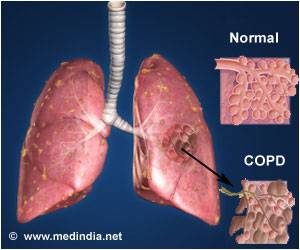
‘BODE score is very essential for a potential lung transplant in patients with Chronic Obstructive Pulmonary Disease (COPD).’
Tweet it Now
They found that in models controlling for BODE score and incorporating lung transplantation as a competing end point, the risk of death was higher in the BODE validation cohort. This shows that patients selected as candidates for lung transplantation survive considerably longer than predicted by the commonly used prognostic estimates extrapolated from the BODE validation cohort. In addition, results indicated that nonrespiratory cause of death was higher in the nontransplant cohort, which supports the idea that comorbid illnesses that are screened out by the transplant selection process contribute a significant amount of morbidity."Survival of patients with COPD who are considered candidates for lung transplantation is significantly better than would be predicted by extrapolation of survival from the cohort in which the BODE score was validated," said Dr. Robert Reed, key researcher. "This is likely due to a lower prevalence of comorbid conditions attributable to the lung transplant evaluation screening process."
Source-Eurekalert












